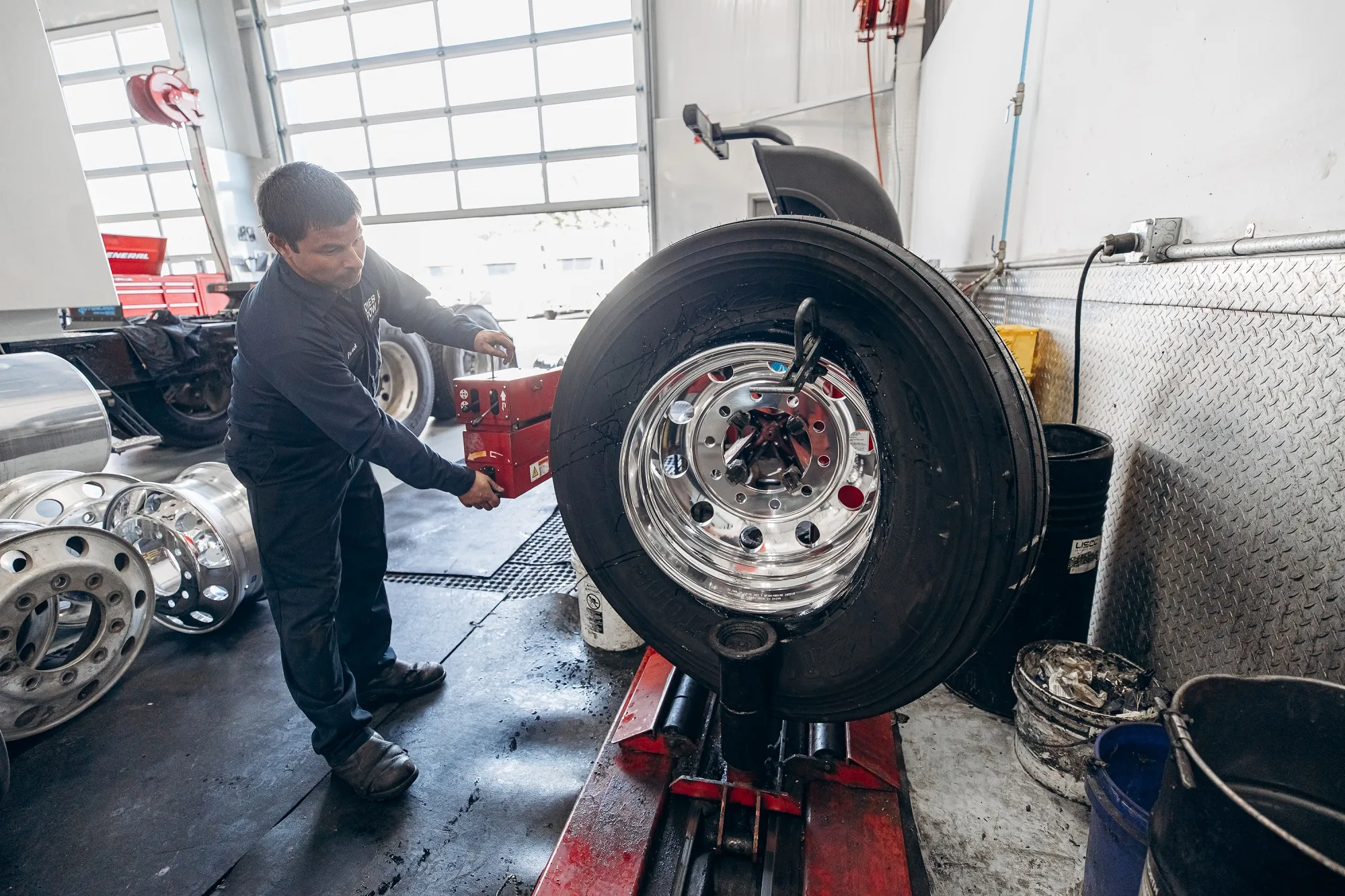Quick Tips for Maintaining Tires at a Heavy Truck Tire Shop
Discover Vital Tire Providers That Maintain Your Vehicle Running Efficiently
Maintaining a vehicle's performance rests on understanding and applying essential tire solutions. Regular tire rotations, appropriate wheel placement, and exact tire harmonizing are vital for safety and effectiveness. Tire stress surveillance additionally plays an important function in general driving experience. On top of that, identifying the indicators that show it's time for a tire replacement can stop a lot more considerable concerns down the road. What are the specific advantages of each service, and how can they influence your vehicle's long life?
The Value of Routine Tire Rotations
Although lots of vehicle owners may neglect tire maintenance, regular tire rotations play a vital duty in extending the lifespan of tires and enhancing vehicle safety and security. Tire turning involves changing the placement of each tire on the vehicle to ensure even put on. Different tires experience differing levels of wear based upon their area; as an example, front tires often use faster as a result of guiding and braking pressures.
Recognizing Wheel Placement and Its Advantages
Tire maintenance is not limited to turnings; wheel placement is an additional essential aspect that significantly influences vehicle performance. Proper wheel positioning guarantees that all four tires make contact with the road equally, which is essential for safe driving. When wheels are misaligned, cars can pull away, resulting in unequal tire wear and compromised handling.
Routine alignment checks can help maintain optimal tire performance, extending their lifespan and boosting gas effectiveness. Additionally, proper alignment contributes to improved guiding reaction, permitting drivers to navigate with greater precision and confidence.
Misalignment can cause unnecessary strain on suspension components, potentially leading to expensive fixings. By prioritizing wheel positioning, vehicle owners can not only ensure a smoother experience however also promote overall vehicle durability. To conclude, recognizing wheel placement and its benefits is essential for maintaining a safe and reliable driving experience
The Duty of Tire Harmonizing in Smooth Rides
While appropriate wheel alignment is necessary for vehicle efficiency, tire balancing plays a just as crucial duty in ensuring a smooth adventure. Tire balancing entails distributing the weight of the tire and wheel setting up evenly around the axle. When tires are unbalanced, uneven wear takes place, bring about vibrations that can affect dealing with and overall convenience throughout driving. This discrepancy can lead to extreme strain on suspension components and may also cause premature tire failure.
Routine tire harmonizing assists preserve optimal contact in between the tires and the road surface, boosting traction and find out this here stability (changement de pneu camion lourd Montreal). It is advised that chauffeurs have their tires well balanced whenever they are placed, turned, or changed. In addition, periodic checks should be executed, particularly if recognizable vibrations or steering wheel wobbling occur. By focusing on tire harmonizing, vehicle proprietors can improve adventure top quality and extend the life-span of their tires, adding to a much safer and a lot more delightful driving experience
Keeping Track Of Tire Pressure for Ideal Performance
Preserving correct tire pressure is crucial for optimal vehicle efficiency, as underinflated or overinflated tires can significantly influence handling, gas efficiency, and safety. Routine tracking of tire pressure helps assure that tires perform at their finest, advertising even put on and extending their life expectancy. Chauffeurs are urged to inspect tire stress a minimum of as soon as a month and eventually trips, as fluctuations due to temperature changes can happen.
Using a reliable pressure scale, people can evaluate whether their tires meet the maker's suggested specs, which are generally located in the owner's handbook or on a sticker inside the motorist's door. Furthermore, lots of modern lorries come outfitted with Tire Stress Tracking Equipments (TPMS) that inform motorists when pressure goes down significantly. By focusing on tire stress checks, vehicle owners can enhance driving comfort, boost gas usage, and guarantee more secure road experiences, inevitably contributing to the overall long life of their tires and vehicle efficiency.
Identifying When to Change Your Tires
Exactly how can motorists identify the appropriate time to change their tires? Acknowledging when to change tires is vital for security and performance. One typical indicator is walk depth; tires need to be changed when walk uses down to 2/32 of an inch. Motorists can do the dime examination by putting a cent into the step; if Lincoln's head is noticeable, it's time for new tires. Furthermore, visual assessments for fractures, protrudes, or uneven wear can indicate deterioration. Another substantial aspect is age; tires should normally be changed every 6 years, despite tread wear. Drivers ought to additionally know modifications in vehicle handling, such as raised vibrations or decreased traction, suggesting tire concerns. Regular rotations and placements can aid extend tire life, however understanding of these indicators is essential for maintaining vehicle safety and performance. Correct tire substitute websites ensures a smoother, much safer driving experience.

Regularly Asked Inquiries
How Often Should I Inspect My Tire Step Deepness?

Can I Turn My Tires Myself?
One can revolve tires independently, given they have the required tools and understanding. Appropriate strategy guarantees even tire home wear and expands life expectancy, however security precautions and vehicle requirements should constantly be complied with to stay clear of prospective issues.
What Devices Do I Required for Tire Upkeep?
To carry out tire upkeep, one calls for essential tools consisting of a jack, jack stands, carry wrench, tire stress gauge, and a tire walk depth gauge. These tools guarantee secure and efficient maintenance of vehicle tires.
Just How Does Climate Influence Tire Performance?
Climate greatly influences tire performance, affecting grasp, wear, and stress. Hot temperature levels can result in enhanced tire pressure and faster degradation, while cold problems might trigger decreased adaptability and grip, ultimately impacting total vehicle security and handling.
Are Premium Tires Well Worth the Investment?
The inquiry of premium tires' worthiness typically develops among vehicle proprietors. Numerous experts suggest that while they set you back more upfront, the advantages of boosted efficiency, safety, and longevity can justify the financial investment for discerning motorists.